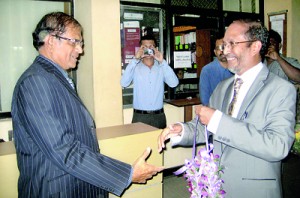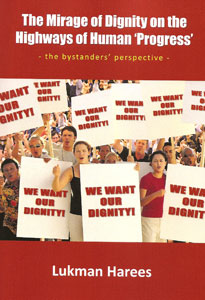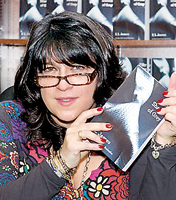Sunday Times 2
Oh, humanity, where art thou?
Reading half way through the preface, I told myself: “This book is for me”. Yes, it is about me. It is for those who have felt that their dignity has been robbed or violated. It is for those who cry for justice and freedom. It is also for those who remain indifferent to injustices even though they and society at large are affected. In short, the book is for the bystander — you, me and the author. The book wakes us up from our slumber and rejuvenates us to do our part for society.

Author Harees (right) receiving chief guest and retired Chief Justice Asoka de Silva at the book launch at the auditorium of the Institute of Chartered Accountants.
Author Lukman Harees, a civic rights activist and trade unionist with a law degree and a post-graduate degree in business management, delves deeper into human dignity, identifies challenges to it, and gives us some suggestions as to what we could do. In his search for human dignity, he sees the hypocrisy of global powers, the exploitation of the poor, the robbing of the resources of the weaker nations by the rich and the powerful. He sees the defects in the global order and the hurdles and the pitfalls on the road to social justice.
He uses human dignity as an analytical tool to explain in detail challenges to it. At the same time, he uses the challenges to human dignity as an analytical tool to espouse the cause of human dignity.
Harees, who hails from Galle and now lives in Britain, successfully drives home the point that humanity is one. To prove his point, he begins Chapter I by drawing the reader’s attention to the moon-landing, an event where every human, whichever country he or she may belong to, felt equally elated.
The moon-landing was indeed a good entry point into the book’s subject matter – human dignity as it clearly displayed that humanity was one. But is this the reality? Alas! Man is man’s worst enemy. This, the author explains to us under several topics and through numerous examples.
We can survive and progress only if we respect each other and understand the value of human dignity. Progress without morality will lead to nowhere but to mankind’s destruction. But are we on the right track? No, the world has become a battleground where only the fittest survive. The powerful thrive in inequality. So there is no real empowerment of the weak. If any, it is only a cosmetic exercise. The party goes on regardless of the plight of the powerless.
Mankind has the capacity to create a just order, but the powerful sustains inequality and gives rise to such social problems that have, in the author’s words, plucked away from the majority of mankind the essence of dignity and self-esteem. The persisting inequality and the global powers’ unwillingness to create a just world order make human dignity look like a mirage on the highway of human progress.
Though the author tries not to provide a straitjacket definition of human dignity, his 749-page book seeks to understand this conundrum. The powerful writing and the carefully selected words inspired by the human in the author shake us to the core and wake up our conscience to defend human dignity and to eliminate the threats to it.
The author points out that there has been many a step taken in the right direction to restore human dignity. For instance, the world has adopted the Universal Declaration of Human Rights (UDHR) some six decades ago, and subsequently several treaties, conventions and protocols on political, economic and social rights, and elimination of all forms of racism and discrimination. But the ground reality speaks of hypocrisy, double standards and human suffering. There exists a yawning gap. The author admits that bridging this gap is a gargantuan task, but he believes that he and every bystander can make that change in a small way, like the old man in the parable which he cites in his book.
Crises are aplenty and examples many as to how in real life the powerful rob the human dignity of the powerless, rendering the UDHR useless. If the holocaust had taken place during an era where there was no recognition for an instrument like the UDHR, look at the genocides that took place in the post-UDHR era: The one million deaths in Cambodia during the Pol Pot rule, Rwanda where some 800,000 people were killed in ethnic hatred and Bosnia where under the very nose of Western powers and the United Nations Peace Keeping Force, thousands of people were massacred in ethnic cleansing.
Apart from these genocides, the book also delves deep into the Palestinian struggle, the wars on terror and many more issues. They are judiciously analysed and presented to prove the author’s fears about an evil process — the dehumanisation of humanity.
Culprits in this process of dehumanising humanity are many. Among them are certainly some scientists and Darwinists. Their post-humanist approach has dehumanised the human race and given rise to the type of racism that manifests itself in double standards of the West. These Darwinist scientists see the human race as just an extension of the animal kingdom or a bag of chemical elements. The author’s moralistic approach comes out strongly when he presents arguments and analyses to prove that Darwinism has led to racism, Eugenics, Nazism, imperialism, colonialism and many forms of exploitation of the poor and the weak.
In many corners of the world, millions suffer silently – bearing the brunt of armed conflicts, famine, oppression and modern-day slavery. Our indifference to their suffering is a sign that dehumanisation has already set in within us. The author reminds the reader in Aldous Huxley’s words that the train to the dehumanised brave new world has left the station.
‘Oh, humanity, where art thou’ is the cry that I heard coming from each page of the book. The book also goes into some detail on crimes against children, how the dehumanised section of society used them as child soldiers, labourers and sex objects. Also analysed in some detail are the abuse of women in the high-tech era where internet and pornography have combined to rob their innocence and human dignity.
Though Sri Lankan examples were hard to come by in the book, I think the book has special relevance to our country, especially in the post-war era where attempts are being made for reconciliation.
What is the value of human progress – our boasting about conquering space, discovering genome or the gene map, and even claims of producing previously non-existent bacteria – if we have not conquered ourselves? What value is the light outside, when the house we live in is in utter darkness? What is the use of the floral scent in the garden outside, when our dwelling is a stinking hell hole?
The author gives the answer, saying material progress is a necessity, but it should be based on moral responsibility. When dignity is denied or robbed, there arises a moral crisis. By strengthening morality, the author believes the process of dehumanisation can at least be checked. Yet, he admits that the mirage of dignity which we see around us amidst the highways of progress will remain so. He says unless the underlying causes for moral decay are adequately addressed, no solution can succeed.
The idealist in him is evident, when he suggests that the yawning gap between what is and what should be should be filled by measures such as character building, teaching children values, uniting pro-dignity forces, strengthening the United Nations through democratic reforms and creating awareness about dangers to dignity and on the need for building loyalty to humanity rather than to a race or a nation.
Lukman Harees by his great scholarly work stands together with history’s great idealists such as Aldous Huxley, Harold Pinter, Thomas Paine, Mohandas Gandhi, Martin Luther King and Nelson Mandela.
As I was reading the book, I asked myself how I would define a good book. I came up with three criteria:
First, a good book should be written in simple but powerful language. There should be punch, but no venom. Well, this book does fulfill this criterion. The author’s moralistic approach to the subject matter binds not only paragraphs and chapters together, but also arguments and ideas.
Second: The book must have a powerful message to the reader. From page one to the last page, the message is clear: Human dignity is not available for compromise.
Third: The book must bring about a positive change in the reader. I felt the change in me and I am sure any reader with moral values also will .
This well-researched book is also a good reference work for any writer or activist whose goal is social justice, for, the author has read or referred to no less than 118 books (the names of which are given in the bibliography), in addition to numerous articles, research papers and visits to many a website to produce this gem of a book.
I want to say that this is a book for me, and I will not part with it.
Follow @timesonlinelk
comments powered by Disqus























